The Group of Twenty (G20) is an international forum intended to discuss policies on economic cooperation and international financial stability. It is attended by government and central bank leaders from 19 individual countries and the European Union. The members are Argentina, Australia, Brazil, Canada, China, France, Germany, India, Indonesia, Italy, Japan, Republic of Korea, Mexico, Russia, Saudi Arabia, South Africa, Turkey, United Kingdom, United States, and the European Union.
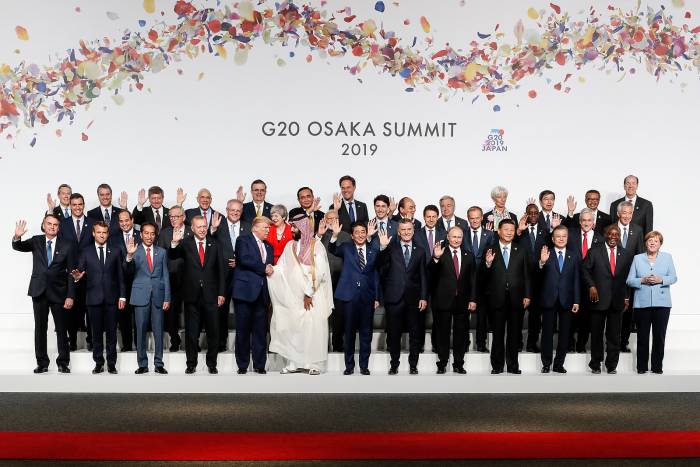
(Osaka – Japão, 28/06/2019) Presidente da República, Jair Bolsonaro, durante foto de família dos Líderes do G20. Photo: Alan Santos / PR
These countries self-selected themselves in the group and claimed their power in the global economy since they are accountable for around 80 percent of Gross World Product, 75 percent of world trade, and two-thirds of the world’s populations. However, their legitimacy has been questioned by other countries. Many criticized the G20’s exclusivity – they are not representative of 90 percent of United Nations member states, excluding some of the world’s largest economies such as Norway and Spain–and its lack of transparency and accountability.
Despite the controversies, the G20 is still an influential world forum as it holds power to shape policies and economies for decades. Like it or not, our future is in their hands. Some questions linger: What exactly are they doing? Do they really have anything to offer the world to seriously address the economic crisis, pandemic, and climate crisis?
The answer is: not really. Especially for Asian countries and here are 3 reasons why.
1. We Are Not Their Priority
The nature of the G20 is to address and solve the world’s economic and financial issues. For instance, in 2008 when the world experienced a financial crisis, the G20 had the opportunity to save the world.
However, based on the Toronto Summit’s outcome in 2010, their interests favored the elite more than peoples’ well-being. They gave stimulations for big companies and bailed out large banks with an excuse to ”rescue” the world’s economy. At the same time, they failed to support ordinary people who were suffering, who lost jobs and their homes.
Of course, they’re in the position to spend the money on whatever they want. The thing is: it is not their money. Instead of spending the money to support people who needed it the most, they have been spending public money, our money, to save the elites.
An award-winning independent think tank, International Institute of Sustainable Development (IISD) said, over the next few years after the global economic crisis in 2008, several countries and the International Labour Organization (ILO) insisted on the G20 needed to address continuing unemployment and rising inequality.
However, the G20 never moved to adopt the policies recommended by these working groups, they were only paying lip service to the call for “more and better jobs.” This has shown the very low premium they give to human lives – their spending reflects their priorities.
This should not happen again in the future. Ordinary people like us should be their top priority when addressing the world’s issues. So what can we do about it?
2. They Keep Supporting Polluters
The G20 is not just supporting or bailing out big companies, they’re supporting the world’s biggest polluters.
It was good news when in 2016, 196 countries signed The Paris Agreement. Within the United Nations Framework Convention on Climate Change (UNFCCC), they agreed to reduce the risks and impacts of climate change.
The goal of The Paris Agreement is to keep the temperature below 2°C above pre-industrial levels or better yet keep the warming limit at 1.5°C. To achieve the goal, these countries must stop doing business as usual and start the transition to 100% renewable energy.
Scientists have shown that if the world leaders continue the business as usual approach, global temperature will rise to 0.5°C in the next 10 years. This number may sound small, but it is actually a big deal for our future.
A study published by European researchers in 2016 examined the impact of temperature rise. 0.5°C temperature rise can cause heat waves that are three times longer, three times more intense in rainstorms, sea-level rise, posing a risk to the health of tropical coral reefs, and even 9 percent less clean water in the Mediterranean area.
All of the G20 members have signed The Paris Agreement, but sadly, they are still funding fossil fuel companies. Recent research shows the majority of the G20 nations are throwing a public finance lifeline to polluting fossil fuel companies. They have been gambling with our future.
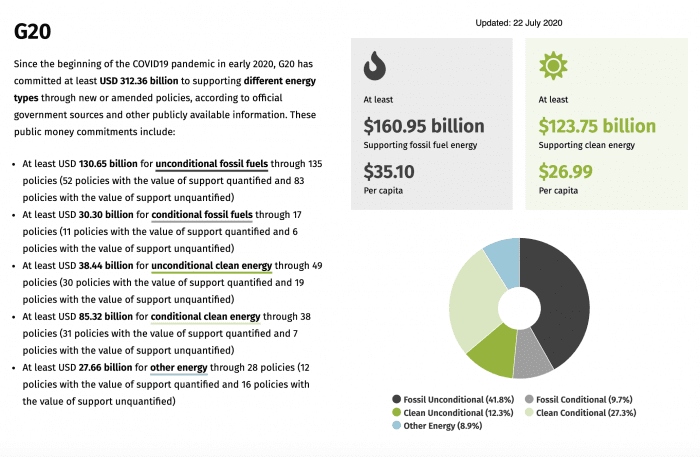
Source: energypolicytracker.org
A useful snapshot of the current situation is put forward by EnergyPolicyTracker.org, a project by 14 expert organizations, including IISD and Columbia University, shows real-time data on public finance for energy around the world. It shows that G20 members are investing 56 percent of public money on fossil fuels, which is USD $150.81 billion. It is the opposite of their commitment to reducing carbon emissions, which is only half of the fossil fuel investment.
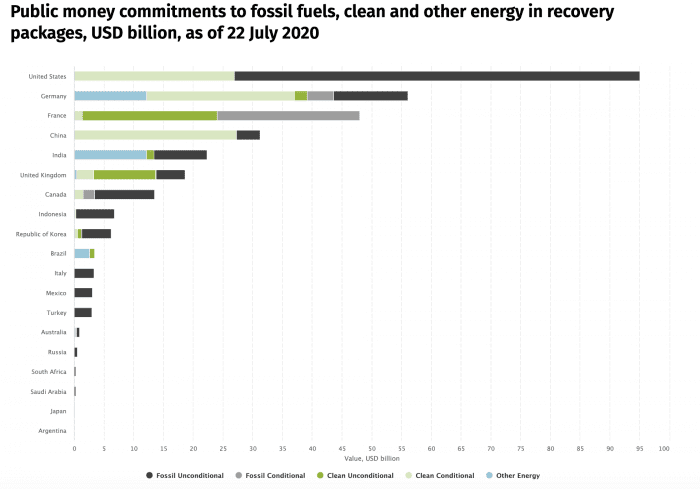
Source: energypolicytracker.org
The data also shows that the five highest ranks of the countries in G20 that committed public money to fossil fuels are mostly Western countries. They are:
- the United States (USD$58.12 billion)
- France (USD$23.95 billion)
- Germany (USD$16.91 billion)
- Canada (USD$12.11 billion)
- India (USD$8.9 billion) as the only South Asian country
This data makes sense because the top four countries supporting fossil fuels are not the most affected countries by climate change impacts. The Global Climate Risk Index 2019 shows the most vulnerable countries are in Asia, South America, and Africa. If this issue is not mitigated, fishermen and coastline communities will lose their homes and be deprived of their ability to sustain their economies.
The Climate Risk Index for 2017: The 10 Most Affected Countries
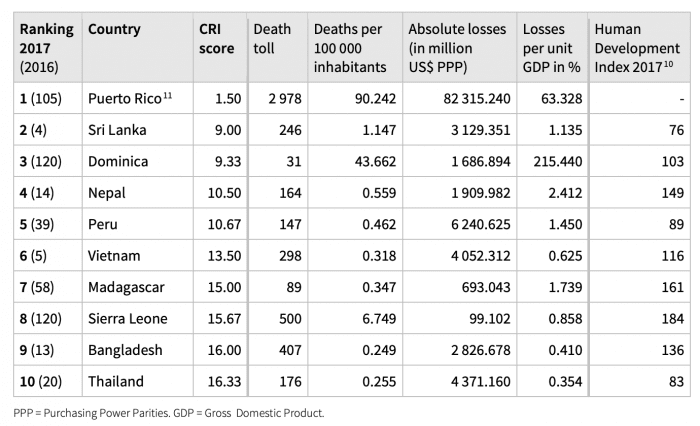
Source: The Global Climate Risk Index 2019
The Long-Term Climate Risk Index:
The 10 Countries Most Affected from 1998 to 2017 (annual averages)
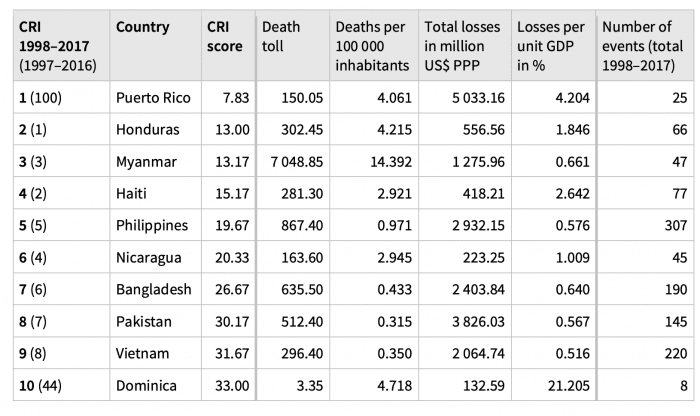
Source: The Global Climate Risk Index 2019
As shown in the data above, none of the most affected countries are in the G20. This creates a huge problem because the most powerful decision-makers in the global economy are not bearing the brunt of climate breakdown. Thus they keep spending public money on fossil fuels. Meanwhile, vulnerable countries continue to suffer.
For instance, Bangladesh–a country that is not part of the G20–has always faced climate impacts like rising sea levels, severe cyclones, intense heatwaves, and frequent flooding. What is worst in this ordeal, is that Bangladesh’s emission levels are nowhere close to any G20 countries.
However, not only Western countries are responsible for the success of the polluters; Asian countries, like China, Japan, and India. China and Japan, have been investing in fossil fuels in Java, Indonesia.
In 2010, the Indonesian government constructed a coal-fired power station that produces a generating capacity of 990-megawatt (MW), in Indramayu, West Java. This project was initiated through a US$562 million loan from the China Development Bank.
This year marks the decade of its operation and the 10 years of suffering that it has brought to the local residents. The coal power plant has changed the tradition of the Indramayu community that has existed since 600 years ago because most of them can not harvest and fish the way they used to do.
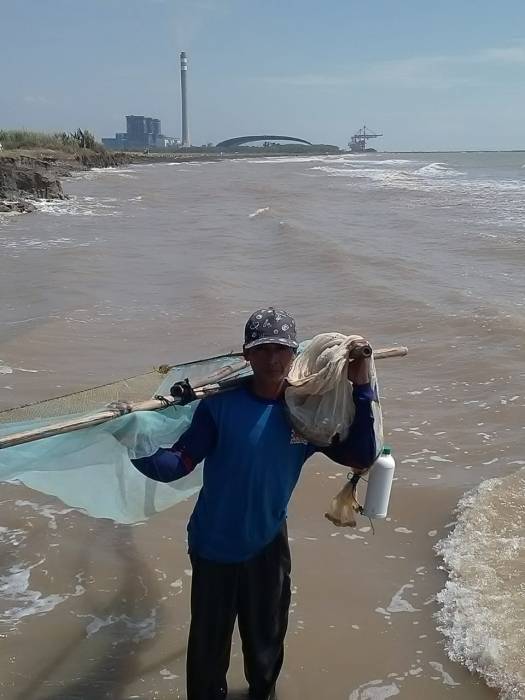
Mistra, a local fisherman in Mekarsari, Indramayu.
He was fishing shrimp from 06.00 AM in the morning to 10.00 AM
but got nothing. (June 2020) Photo © JatAyu
The local residents are also worried about the pollution from coal ash, which is known to cause respiratory diseases, especially among young children. Acute Respiratory Infections (ARI) can cause deaths among children under 5 years old.
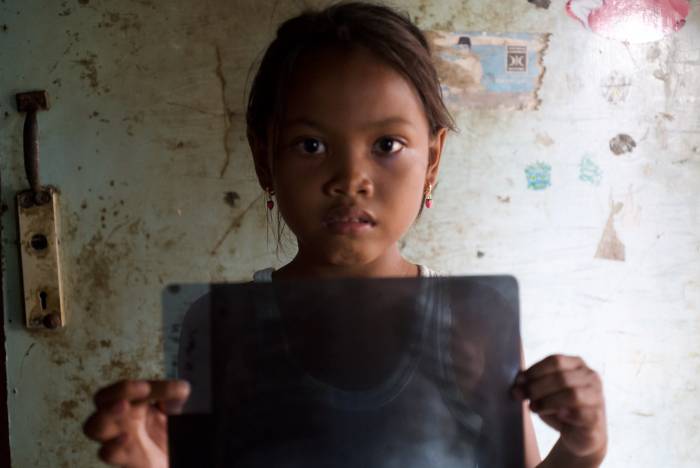
An 8-year-old girl from Indramayu shows an X-ray showing that she has lung disease (2017).
Photo © Ardiles Rante
And today, when they are still struggling to overcome the damage from the power plant, the Indonesian government is planning to build a second power plant in their village. A report says the government received funding from the Japan International Cooperation Agency (JICA), the aid agency of the Japanese government.
Again, this is unfair, considering the one whose profits are not impacted by coal, while the one who suffers is not benefitting.
As one of the most powerful countries in Asia that are also directly affected by climate change, Indonesia should be more conscious. They could be a breath of fresh air in the G20 forum decisions in investing public money on safe and sustainable energy.
Unfortunately, no. The data from EnergyPolicyTracker.org shows that Indonesia is ranked sixth in the G20 as the country that invests public money in fossil fuels, which is USD$6.49 billion. On clean energy, they only invested USD$238.17 million. Almost 30 times less than fossil fuel.
During the COVID-19 pandemic, when they should have been focusing on addressing public health and unemployment, the Indonesian representatives signed the new Mining Law, despite it not being an obvious priority for the people. This law obviously benefits the coal mining industry, since it is mostly focusing on expanding the Coal Mining Work Agreement.
G20 should create resilience for future crises, instead of making money for a short period of time. Moreover, it seems like G20 countries are depending on fossil fuels as they believe this sector can salvage the economy. Which is not true. Bhutan is one of the perfect examples. They have zero-emissions yet they still receive investments from other countries.
G20 countries should learn that we are not only facing the economy and financial crisis, but also the social and ecological crisis in the long-term. So what can we do about it?
3. G20 2020 Summit Fails to Address the Current Pandemic
Last Saturday, 18 July 2020, the G20 Finance Ministers and Central Bank Governors met to discuss and address how the world can recover from the Covid-19 pandemic. Although they agreed to continue providing Debt Service Suspension Initiative to poor countries affected by Covid-19, they did not raise any significant plans on how to address the social challenge of this pandemic.
The General Secretary of International Trade Union Confederation (ITUC), Sharan Burrow said, “There is little focus on jobs and social protection. And while there are encouraging words about digital infrastructure, the finance ministers seem to be treading water on vital issues such as debt relief, creation of a social protection fund for the poorest countries, investment in health and care, and universal access to treatment and eventual vaccines. There are no new commitments to adequately resource the International Financial Institutions, nor to reforming them to align with the Sustainable Development Goals.”
Therefore, we insist the G20 put human rights and public interest above big corporations, and not repeat the same mistake by getting back to business as usual as in 2008. They must ensure that in response to this pandemic Covid-19, G20 countries should not only focus on improving the global economy but also uphold Just Recovery principles to a better future for those most in need in the wake of this crisis.
The five principles of a Just Recovery are:
- Put people’s health first, no exceptions.
- Provide economic relief directly to the people.
- Help our workers and communities, not corporate executives.
- Create resilience for future crises.
- Build solidarity and community across borders – do not empower authoritarians.
Importantly, the G20 countries must shift investments to a just and green transition. As Nobel laureate in economics, Joseph Stiglitz said, the green transition can be timely, labor-intensive (helping to resolve the problem of soaring unemployment) and highly stimulative – delivering far more bang for the buck than tax cuts.
Our aim must not only shift to a green economy. We must also implement a Just Transition, which is to secure the rights and livelihoods of fossil fuel workers and their communities in the transition to a low-carbon economy.
What can we do about it?
Although G20 is considered an influential forum, our voice is greater than that. We are greater than our leaders. If our future is in the hands of G20 leaders, their decisions are dependent on our voices.
We should not take the liberty of free speech and available technology to influence others, for granted. Let’s keep our eyes set on G20 leaders, keeping in check their spending priorities, and reclaim our future.